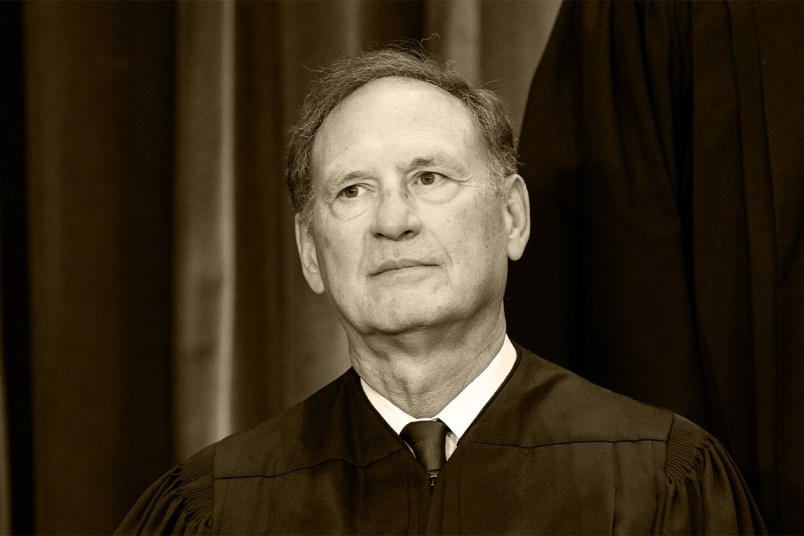The Supreme Court has ended the constitutional right to an abortion, overturning Roe v. Wade.
Justice Samuel Alito wrote the opinion, joined by Justices Clarence Thomas, Neil Gorsuch, Brett Kavanaugh and Amy Coney Barrett. Thomas, Kavanaugh and Chief Justice John Roberts wrote concurring opinions. Justices Sonia Sotomayor, Elena Kagan and Stephen Breyer dissented.
“We hold that Roe and Casey must be overruled. The Constitution makes no reference to abortion, and no such right is implicitly protected by any constitutional provision, including the one on which the defenders of Roe and Casey now chiefly rely—the Due Process Clause of the Fourteenth Amendment,” Alito wrote.
The dissenting liberals underscore the real-world consequences of this decision: women will be forced to carry pregnancies resulting from rape, to give birth to children with fatal diseases, and, in some states, to give birth even when it threatens their own life.
“Most threatening of all, no language in today’s decision stops the Federal Government from prohibiting abortions nationwide, once again from the moment of conception and without exceptions for rape or incest,” the three write in the joint dissent.
“The majority has overruled Roe and Casey for one and only one reason: because it has always despised them, and now it has the votes to discard them,” they add later. “The majority thereby substitutes a rule by judges for the rule of law.”
Thomas would take things a step further. In a concurring opinion, he urges the Court to now take a hatchet to its other major privacy-based rights.
“For that reason, in future cases, we should reconsider all of this Court’s substantive due process precedents, including Griswold, Lawrence, and Obergefell,” he writes, naming the landmark cases that protect access to contraception, same-sex relationships and same-sex marriage.
Roberts, in his concurrence, writes that he would not have overturned Roe, preferring just to nix the viability line.
“Surely we should adhere closely to principles of judicial restraint here, where the broader path the Court chooses entails repudiating a constitutional right we have not only previously recognized, but also expressly reaffirmed applying the doctrine of stare decisis,” he writes. “The Court’s opinion is thoughtful and thorough, but those virtues cannot compensate for the fact that its dramatic and consequential ruling is unnecessary to decide the case before us.”
Kavanaugh provided a small, though significant, ray of hope for the preservation of abortion rights in his concurrence.
“May a State bar a resident of that State from traveling to another State to obtain an abortion? In my view, the answer is no based on the constitutional right to interstate travel,” he writes.
State jurisdiction disputes over people traveling to seek abortions will be the next legal frontier.
Alito’s draft majority opinion, leaked in May, was largely the same as the opinion released Friday. It showcased an extremist argument overturning abortion rights, and was permeated with support of fetal personhood, the theory under which anti-abortion activists want to outlaw the procedure nationwide, and with empty promises that somehow this decision would not threaten other privacy-based rights.
It was an untempered victory lap in Roe’s demise.
Abortion rights advocates knew Roe v. Wade was on the chopping block from the moment conservatives amassed a supermajority on the Supreme Court. The question was never whether this Court would attack Roe, it was whether it’d do so by degrees or wholecloth.
The Court’s decision last year to take up Dobbs suggested the latter. It’d be nearly impossible for justices to decide the case without, at the very least, addressing the viability line which has hovered at 24 weeks for decades.
The conservative justices did little during oral arguments to mask their intentions. Barrett and Kavanaugh brought up previous Supreme Court precedents, like Plessy v. Ferguson, that are now famous for having been wrongly decided. Barrett asked why abortion is necessary at all when safe haven laws exist to let women relinquish their babies, a talking point rooted in the anti-abortion movement. Justice Samuel Alito regurgitated debunked arguments about fetal pain.
The liberal justices, meanwhile, delivered dirges — orating more for posterity than the present.







Frist. And dying.
We got work to do, people.
I’d rather not be first
Politically designed to knock the Jan6 Hearings off the front page.
But we already knew it was coming.
And that’s why the CJ was so pissed about the leak. It watered down the effect for which they had hoped.
Tell me the one again about her emails.